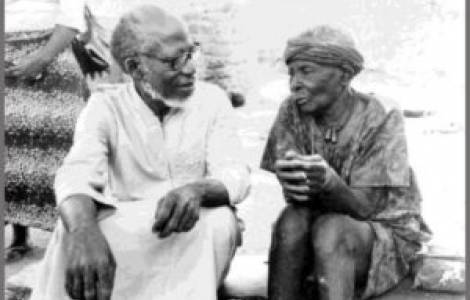
Iesus Caritas
Vatican City (Agenzia Fides) - On Saturday, May 20, the Holy Father authorized the Dicastery for the Causes of Saints to publish some Decrees, including those concerning the recognition of the heroic virtues of the Cameroon diocesan priest Father Simon Mpeke, born around 1906 in Batombé and died on August, 13, 1975 in Édéa, and of lay catechist Arnaldo Canepa, born on September, 24, 1882 in Rome and died there on November, 2, 1966.
Simon Mpeke, the first "venerable" Cameroonian, was born around 1906 in Batombé (Édéa, Cameroon), into a family of pagan peasants of the Bakoko ethnic group. After completing his studies at the Catholic mission school of the German Pallottines, he asked to be Baptized and was baptized on August 14, 1918, by the French Spiritans. According to the biographical notes of the Dicastery for the Causes of Saints, he became a teacher and taught for a certain period until he felt the call to the priesthood. On December, 8, 1935 he was ordained a priest. He worked for twelve years as Vicar in the Ngovayang mission. In 1947 he was appointed parish vicar and, two years later, parish priest of a large indigenous parish in New-Bell Douala. He distinguished himself for the depth of his spiritual life and pastoral dedication. He entered the Secular Institute of the Little Brothers and Little Sisters of Jesus and became in 1956 one of the founders of the same Union in Cameroon.
He was also the first Cameroonian "fidei donum" missionary in the north of the country, inhabited by people of Sudanese origin, including both Muslims and followers of traditional religions. Travelling through the mountains, Fr Simon Mpeke – affectionately known as “Baba (father)Simon” to the local people – preached the Gospel to the indigenous Kirdi people. Moved by his example, a fervent Christian community soon sprang up. He died on August 13, 1975 in Édéa.
Arnaldo Canepa was born in Rome on September 24, 1882, into a wealthy family. He fell away from the practice of his faith until May 1921, when after confessing, he began a fervent Christian life. He became a Franciscan tertiary and catechist. He also joined the Conference of St Vincent de Paul and the Marian Congregation. In 1924, together with other lay people, he adapted a shed in the deprived neighbourhood of Quadraro, to facilitate access to catechism for the children of the area. He dedicated himself to the latter on a daily basis, starting an oratory in which to spiritually develop the younger generations and materially assist the most needy. Pastoral initiatives inspired by the Servant of God spread to the suburbs throughout Rome.
In 1943 Arnaldo started the 'Federation of Roman Oratories', later called the 'Centre of Roman Oratories' (C.O.R) founded on four pillars: Mass and catechism; daily oratory; various monthly special activities and missionary apostolate; devotion to Our Lady. Thanks to his example, by the early 1950s, more than half of the parishes in the diocese had an oratory. In the 1960s criticisms against him began and the very activity of the oratory experienced a crisis, above all because of the protest movements both inside and outside the ecclesial circles. He decided to spend his last years in a spirit of poverty and service, comforted by frequent Eucharistic adoration and the prayer of the Rosary, in a small, open room in the clinic of Santa Maria della Fiducia. He died in Rome on November 2, 1966. (SL) (Agenzia Fides, 22/5/2023)